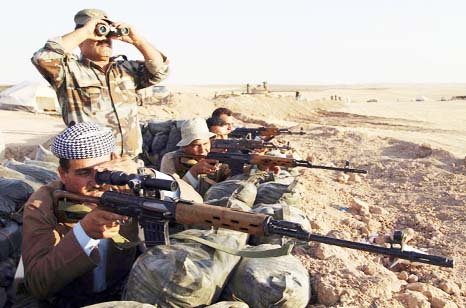
Agencies, Beirut :At least 23, including 16 Peshmerga soldiers, killed in ISIL assault in restive provinces of Nineveh and Diyala.Fighters from the Islamic State of Iraq and the Levant (ISIL) have launched a series of attacks in Iraq’s restive region, killing dozens of people, including several Kurdish Peshmerga soldiers.Sources told Al Jazeera that at least 16 Peshmerga soldiers were killed on Thursday trying to repel an ISIL attack on the Mosul Dam in Nineveh province.The dam, located on the Tigris river, provides electricity to north-western province of Anbar, which is under the ISIL group’s control.In another attack, seven fighters from militias fighting against ISIL in Diyala Province were killed in the town of Al Mansuriya.Meanwhile, in the flashpoint town of Sinjar, Peshemerga forces, backed by US-led coalition warplanes, stopped an attack on the town’s south-western side. The ISIL fighters have since mostly been driven out of the area.The capture of Sinjar by ISIL fighters and the plight of the mostly Yazidi population there was cited by President Barack Obama as one of the reasons for the US military intervention in Iraq.US-led forces launched 12 airstrikes against the group’s positions overnight on Wednesday, targeting tactical units, buildings and equipment used by the group, the Combined Joint Task Force said in a statement.Despite nearly 5,000 bombs being dropped against the armed group, General John Allen, the US envoy for the global coalition to counter ISIL, said more time and training was needed to retake ISIL’s stronghold of Mosul.”We expect we will see the effectiveness of this force improve over time and we believe that they will be able to take back the population centres and municipalities,” Allen said.ISIL spearheaded an offensive in June last year that overran Iraq’s second city Mosul and then swept through much of the country’s Sunni Arab heartland including three major cities.Iraqi soldiers and police, Kurdish forces, Shia militias and Sunni tribesmen have succeeded in regaining some ground from ISIL. But large parts of the country remain outside Baghdad’s control.AP report adds With more than a thousand militants killed and territory slipping away, the Islamic State group is losing its grip on the Syrian border town of Kobani under intense U.S.-led airstrikes and astonishingly stiff resistance by Kurdish fighters.It is a stunning reversal for the Islamic State group, which just months ago stood poised to conquer the entire town – and could pierce a carefully crafted image of military strength that helped attract foreign fighters and spread horror across the Middle East.”An IS defeat in Kobani would quite visibly undermine the perception of unstoppable momentum and inevitable victory that IS managed to project, particularly after it captured Mosul,” said Faysal Itani, a fellow at the Atlantic Council, referring to the militants’ seizure of Iraq’s second-largest city during its blitz into Iraq from Syria last summer.It would also rob the group of a “psychological edge that both facilitated recruitment and intimidated actual and potential rivals, as well as the populations IS controlled,” Itani said.In September, Islamic State fighters began capturing some 300 Kurdish villages near Kobani and thrust into the town itself, occupying nearly half of it. Tens of thousands of refugees spilled across the border into Turkey.By October, Islamic State control of Kobani was so widespread that it even made a propaganda video from the town featuring a captive British photojournalist, John Cantlie, to convey its message that Islamic State fighters had pushed deep inside despite U.S.-led airstrikes.The town, whose capture would give the jihadi group control of a border crossing with Turkey and open direct lines between its positions along the border, quickly became a centerpiece of the U.S.-led air campaign in Syria. U.S. Secretary of State John Kerry declared it would be “morally very difficult” not to help Kobani.The U.S.-led air assault began Sept. 23, with Kobani the target of about a half-dozen airstrikes on average each day, and often more. More than 80 percent of all coalition airstrikes in Syria have been in or around the town.Washington report adds: US President Barack Obama and British Prime Minister David Cameron vowed a united front on Wednesday against the threat posed by Islamist extremists and their “distorted ideology.”In a joint opinion article that appeared in Thursday’s Times of London newspaper and released on Wednesday night in Washington, Obama and Cameron outlined the principles of the U.S.-British alliance ahead of two days of White House meetings.The two leaders are to have a working dinner on Thursday night and hold more talks on Friday.Obama and Cameron, noting the Paris attacks last week against a satirical newspaper, said extremists would not muzzle freedom of speech.”Whether we are facing lone fanatics or terrorist organizations such as al-Qaeda, Islamic State or Boko Haram, we will not be cowed by extremists. We will defeat these barbaric killers and their distorted ideology,” the leaders wrote.Obama and Cameron were also firm in their resolve to stand up against Russia’s aggression in Ukraine. They pledged to maintain diplomatic pressure on Moscow.The United States and Europe have imposed a variety of sanctions against Russia in retaliation.

